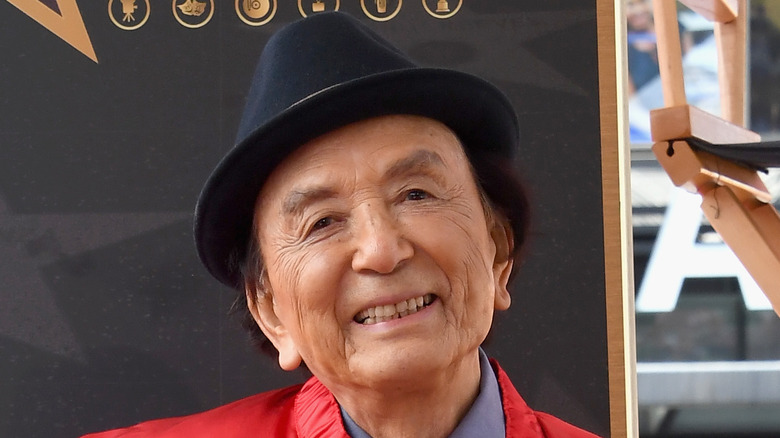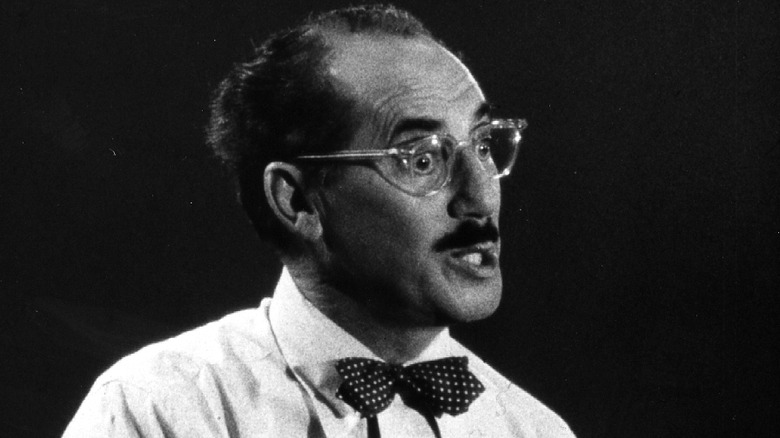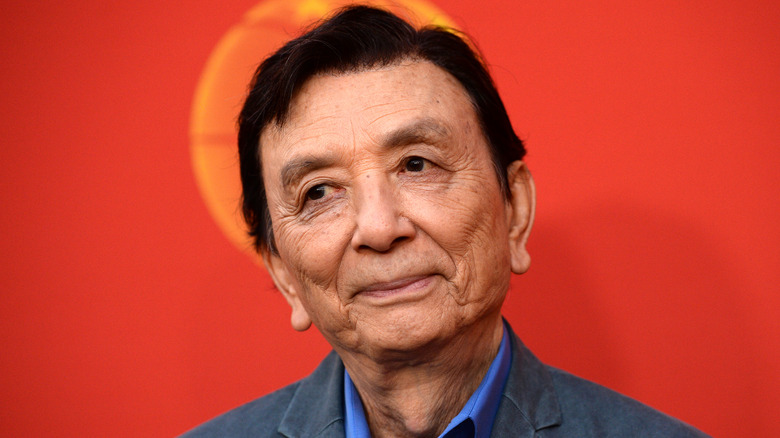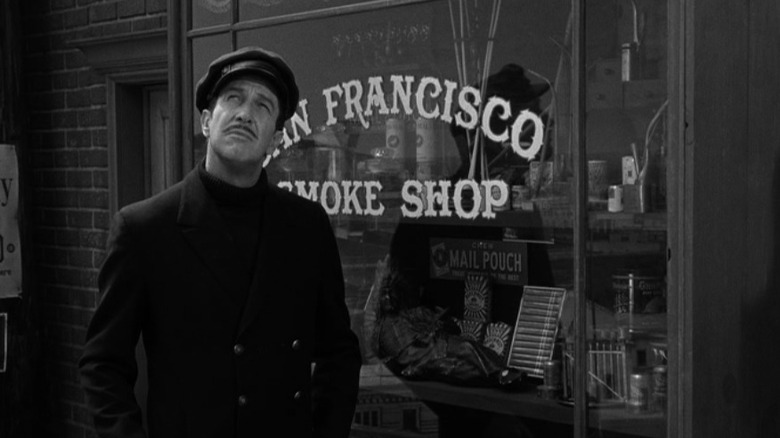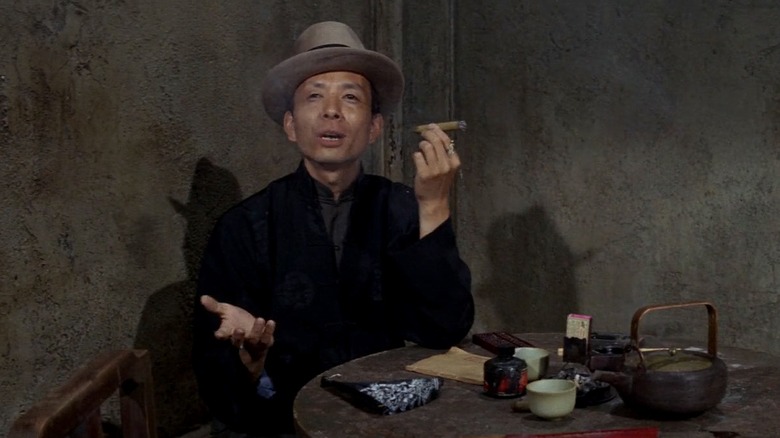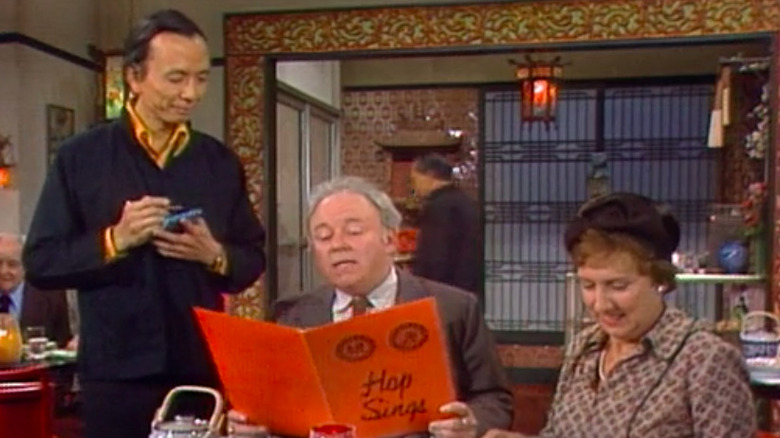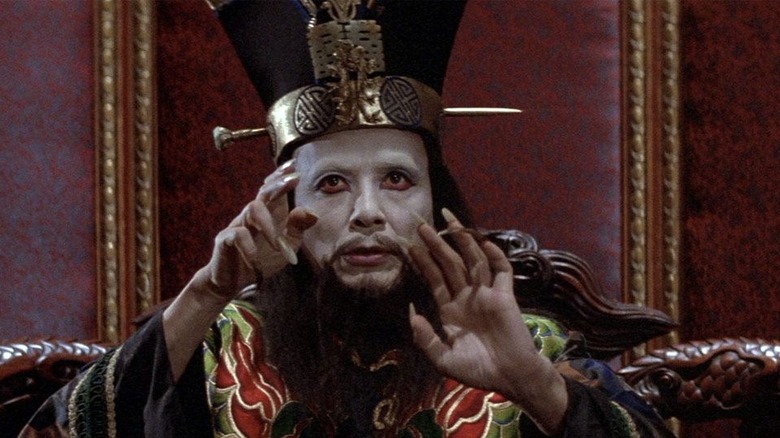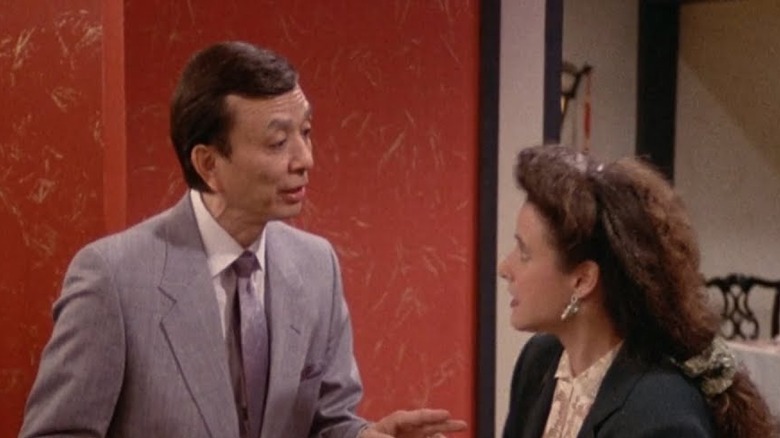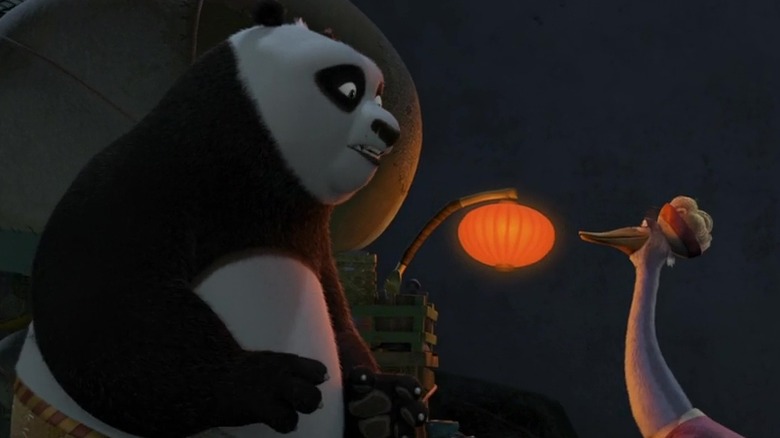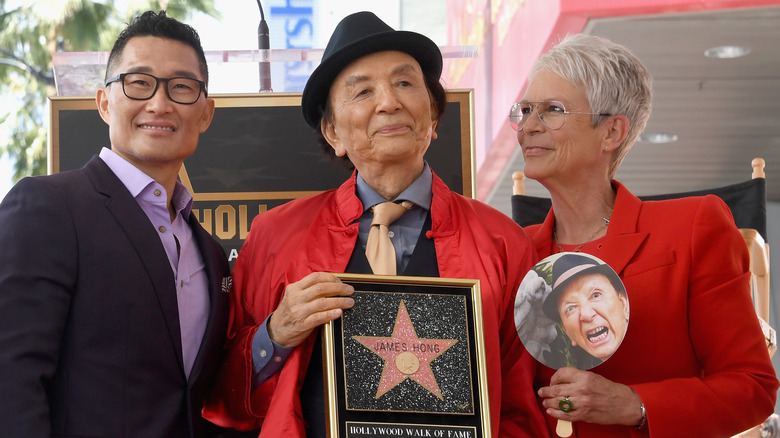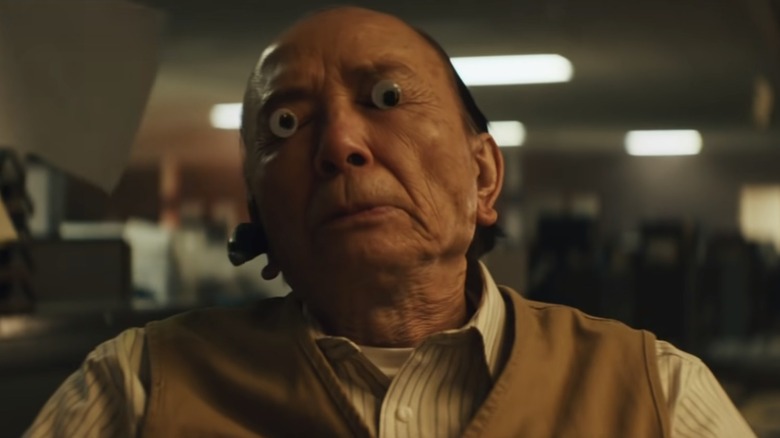The Untold Truth Of James Hong
Legendary character actor James Hong is someone you've undoubtedly seen or heard before, even if you don't know his name. From "Chinatown" to "Airplane!" and "Wayne's World 2," he's become familiar to audiences in roles that might not have been notable otherwise. Often cited as one of history's most prolific actors, he's managed to make his mark even in projects that didn't have much on the page — and he doesn't seem to want to slow down anytime soon, with notable recent appearances in "Everything Everywhere All at Once" and "Turning Red."
A working actor who's had his career for decades, James Hong initially struggled in an industry that didn't have many opportunities for him. But against all odds, he's succeeded even when the deck was stacked against him, so let's take a look at how Hong found success — and what he thinks of the roles that defined him.
His career got started thanks to Groucho Marx
Not many living actors can say that they worked with Groucho Marx, but James Hong is one of them. On an episode of Marx's quiz show "You Bet Your Life," Hong was still a college engineering student who did impersonations, including one of Marx himself. The appearance was such a hit that Hong wound up getting an agent because of it — which was worth much more than the $140 that he won on the show.
Hong gives credit to the appearance helping him out, saying "It changed my life that I got on Groucho Marx's 'You Bet Your Life' ... He said 'I guess you'll have to do me,' so I did him, and the crowd ... just applauded, and sent in all kinds of fan mail." Hong says it resulted in the second-biggest fan mail haul the show ever received, which makes you wonder what the biggest was.
James Hong worked to make even the most stereotypical roles more human
James Hong wasn't given a lot to work with when he was starting out, but he worked hard to make his roles three-dimensional. When interviewer Ben Mankiewicz pointed this out, Hong responded, "If you didn't play the roles that were given to you, you would be not working at all. And so, in a sense, in order to keep up my craft, I had to take these roles as the Chinese railroad worker or laundryman and so forth."
In fact, Hollywood's terrible treatment of Asians is something that interviewer Mankiewicz's family has had a hand in. His great-uncle Joseph L. Mankiewicz, the famed filmmaker, made a 1958 adaptation of Graham Greene's "The Quiet American" which cast an Italian actor named Giorgia Moll as the most prominent Vietnamese character. It's a sign of how far we've come — and how far we still have to go.
He tried to get a racist film rewritten
James Hong didn't get to be selective early on and turn down bad jobs that he didn't want to do. Despite this, there was one film starring Vincent Price that left him feeling that he just couldn't accept the material he was given.
He recalled for Deadline, "To see so many stereotypical roles ... and then to see what was offered us: 'Confessions of an Opium Eater' directed by Albert Zugsmith. I said to a group of us, all Chinese, Asians, we cannot do this film because every role in it is a bad role for the Chinese. I took us all up to the director's office and several of us Chinese sat around with Zugmsith and said this is not a good image for the Chinese because they are all prostitutes and opium eaters. He listened and then said he didn't care and was going to make the film anyway." Hong wound up losing the job, but he stood up for his principles.
James Hong started a theater troupe
While Hong was getting work in the 1950s and 1960s, there weren't a lot of opportunities for Asian actors to break out. Frustrated with the lack of substantial roles, he and a friend came up with a plan. "Mako ... came to my apartment and I said, 'Let's do something. We're not getting anywhere!' Everything was a step backwards. I said, 'Let's form some kind of group here, and do a play." They founded the East West Players and did a production of "Rashomon" that attracted the attention of director Robert Wise, who cast Mako and Hong in "The Sand Pebbles" — which would earn Mako an Academy Award nomination for Best Supporting Actor in 1967.
Despite the Academy Award nominations for that film, modern audiences probably know Mako more for his vocal performances, including his work in "Avatar: The Last Airbender." While vocal actors are rarely in the same room as their colleagues, Mako and Hong had a reunion of sorts when Hong did guest appearances in "Avatar" as a monk in the Season 1 episode "The Storm" and as Mayor Tong in the acclaimed Season 2 episode "Avatar Day."
Norman Lear told him he had perfect timing
James Hong has played a number of Chinese waiters over the years, but on "All in the Family," his comebacks to Archie Bunker helped him defy the servile stereotype. At one point in "Edith Breaks Out" (Season 6, Episode 8), Archie asks him why he doesn't have an accent anymore, and Hong's character says he bought the restaurant since the last time Archie saw him.
It was actually Hong's second character on "All in the Family" (something he's done on a number of shows), and the legendary creator of the series essentially came up with the role for him. As Hong recalled, "Norman Lear said, 'James, your timing is just perfect. I've got to look for something for you.' So, to come from Norman Lear, who is the king of comedy writers and directors, that was quite a compliment." It's a shame that Hong never got to be the lead in his own sitcom, but he was at least able to provide laughs whenever he could.
How James Hong feels about Big Trouble in Little China
"Big Trouble in Little China" may have been a flop when it was released in 1986, but the John Carpenter film has since become a cult classic. As with his earlier turn in "Blade Runner," a film that disappointed at the time is now one of the main things that people recognize Hong for.
Hong spoke of his fondness for the part to Polygon, telling the site, "It's no trouble for me to go from the benign grandpa to the villain, who is somewhat a version of Lo Pan. I always recall upon 'Big Trouble in Little China' and Lo Pan. It was a great thing for me to be in that movie with John Carpenter and accomplish what I did. That character, of course, replays in my mind ...There is almost always a facet of Lo Pan in other characters I play."
He improvised on Seinfeld and made it better
One of Hong's most famous television roles found him playing a Chinese restaurant worker on "Seinfeld" — and just as he had on "All in the Family," he made the most of it. "The Chinese Restaurant," (Season 2, Episode 11) the episode of the show where the gang waits for their table in real time, is often cited as a great example of why so many deemed it a "show about nothing."
Hong later reflected on the episode, saying, "I read the script and it says Elaine puts a tip of $5 on my desk and I ignore her. I said to the director, 'How could any maître d' ignore a $5 tip? That's not real.' He says, 'I don't know, but you'll make it work.' So, come to the scene ... When she put the $5 down, I simply turned the page on the guest list and covered up the $5 and I said, 'Yes, what is it you want?' And she said, 'No, no, no!' I made sense out of nonsense." It was a small guest part, but most introductions to Hong will list it as a reason why this prolific character actor looks so familiar.
James Hong was originally supposed to play Dustin Hoffman's role in Kung Fu Panda
When James Hong landed — and lost — the role of martial arts mentor Shifu in "Kung Fu Panda," he missed out on a great opportunity to play a scene-stealing part. Ultimately, however, it turned out to be for the best — the character he did play ended up being the heart of the film.
He explained, "The role that I was supposed to play, Dustin Hoffman got the part. In the final moments of beginning the movie, they said, 'James, I'm sorry about that. But there is another role if you want it.' And Mr. Ping turned out to be a much better role than the old master because Mr. Ping had all those frailties, and I played that to the hilt ... It's a role that's got heart." Whether it was because the studio wanted a bigger star or because the role would have been too similar to the one Hong played in "Balls of Fury," Hong lost out — but wound up winning in the end.
James Hong's star on the Walk of Fame
It seems strange that an actor with more than 650 credits wouldn't be on the Hollywood Walk of Fame already, but after almost seven decades of work, James Hong finally received that honor. The oldest actor ever to be added, he's also just one of 19 Asians on it, even though there are more than 2,700 stars. "Hawaii Five-0" star Daniel Day Kim helped make it happen, starting a GoFundMe to raise the necessary capital. Hong of course, has been working so long that he played several guest roles on the original "Hawaii-Five-0" from 1969-1974, as well as on the Kim-led reboot in 2018.
Hong is very appreciative of the effort, saying, "I want to thank all the fans and friends who donated their money. It boggles my mind to think that there's enough people out there who would do that."
James Hong's Everything Everywhere All At Once thoughts
"Everything Everywhere All at Once" is a film bursting with so much imagination that it can be messy at times. In a time when so many Hollywood films play it safe, that messiness is part of the movie's charm, but that also makes it fair to criticize — and James Hong has shared his own feedback regarding the film.
During Hong's chat with Consequence, interviewer Liz Shannon Miller said there's nothing she'd want removed from the film, but Hong disagreed. "I myself thought it was a little too long," he pointed out. "There was a little too much of the wheelchair going back and forth through the multiverses." Hong went on to say that he wished less of his performance had been cut from the final version, but his take on the movie was far from negative — he deemed it "one of these psychic movies that eats into a person's soul," saying he's happy that people are enjoying it.
